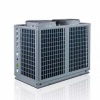sprsunheatpump's Blog
How Does A Pool Heater Work?
SPRSUN Pool heat pumps are a cost-effective, environmentally-friendly way to properly heat a pool. Pool heat pumps can save pool owners valuable money in the end because they tend to have a much lower yearly operating costs than electric heaters and also with proper maintenance, will last up to ten years or longer. In addition, pool heat pumps provide a safer environment for kids and homeowners all across the country.
Pool heat pumps circulate warm outside air through a heat exchanger. The warm air is then blown into the pool's water where it warms up. This action warms up the water's interior. The warmer water adds to the temperature of the pool and the evaporation process produces hot water that feeds the pool's filtration system and pumps. With all of these processes happening simultaneously, pool heat pumps utilize less energy than standard heating methods like fireplaces or furnaces.
In choosing a pool heat pump, there are three main types of equipment to consider. First, a gas-powered heater is the best choice if you do not have access to an electrical outlet. It heats the water from the outside and propane tanks need to be placed inside a propane tank which needs to be kept securely filled at all times. A gas heater has the potential to create dangerous carbon monoxide leaks and also can be extremely noisy.
An in-ground pool heat pump, on the other hand, uses ground heat to warm the water. The water is circulated through piping that brings the temperature closer to the actual outdoor temperature. Because it does not use electricity or propane, an in-ground heater is a greener option. However, this type of heater is susceptible to damage from freezing temperatures and is unable to maintain a constant temperature throughout the entire pool area. Unlike an above-ground pool heat pump, an in-ground unit cannot accommodate changes in outdoor temperature.
Another alternative to an in-ground heater is a portable gas heater. This type of pool heat pump has no moving parts, so is incredibly quiet. Some portable heaters do use oil for lubricating the pump's bearings. Because a gas heater is powered by natural gas, it has the potential to cause carbon monoxide leaks. Because this type of heater is capable of providing warmth only for a short period of time, its efficiency is reduced.
Finally, there is the electric pool heater. An electric pool heater runs on electricity and can operate on either a negative or a positive voltage. Because it uses electricity, an electric heat pump must be attached to an electrical outlet and, although the cost may initially seem excessive, the long-term savings on energy bills will more than make up for it.
The coil or evaporator coil is the most important part of any pool heat pump. The coil is responsible for transferring the warmed up water into the appropriate chilled compartments. Two types of coils are available, those that need water to be continuously sprayed onto them, and those that are self-cleaning. If the coils are self-cleaning, they require no water to be continuously sprayed onto them. On the other hand, if the coils need water to be continually sprayed onto them, they must be connected to a water source such as a hot water tank.
The working of a pool heat pump works in a very simple manner. It transfers heat from the pool water into the pool water and then brings the heated water back out of the pool. The pool water is kept at a comfortable temperature by the constant transfer of warm air from the compressor to the coils, which heats it back up, and then to the inground pool heat pump.
Air Source Heat Pump Installation Costs - How You Can Help Reduce the Costs
An air source heat pump simply is a portable, lightweight heating unit that utilizes the outside air to heat either one or multiple containers at one time, using the air temperature as its source of energy. This alternative heating and cooling technology are especially helpful for homes or offices that need a portable heating and cooling, without sacrificing the size or bulk of an air conditioning unit. With the same principles of refrigerant cooling as traditional air conditioning systems, an air source heat pump operates on the same principles. A standard air conditioning unit uses Freon refrigerant to cool the air in your home, but an air source heat pump refrigerant, which is also commonly used in refrigerant freezers, can be used instead. Because of its compact size, an air-source heat pump can be installed in almost any place, even on roofing, along walkways or in the garage.
Although many people associate air source heat pump system with the manufacture of refrigerant free coolers and air conditioners, this technology actually utilizes the principles of both. The major difference between the two is that an air source heat pump utilizes cold air as its source of energy, while a refrigerant based cooling system uses Freon and other volatile organic compounds (VOCs) to cool the air. Air source coolers, when used in a commercial setting, can help to reduce the harmful effects of VOCs by removing them from the air. This reduction in toxins reduces exposure to harmful irritants, which in turn, lowers allergic reactions and asthma attacks.
Not only do air source heat pump systems decrease indoor air pollution, but they also have the added benefit of reduced operating costs. As mentioned before, the main benefit of using these systems is their ability to provide a continuous source of energy that eliminates the need for large up front installation costs. Since these systems are so easy to install, they can be incorporated into any new building construction at a low cost to the builder, reducing installation costs to the overall project.
When it comes time to choose a new heating and cooling system for a newly constructed or remodeled home, many homeowners forget one of the most important parts of their new HVAC units - the hot water radiator. Installing an air source heat pump allows for a simple upgrade, increasing the comfort level and efficiency of your heating and cooling system. These pumps also provide a number of environmental benefits. Since they don't waste heat produced from burning coal or oil, the result is a much cleaner environment. Also, because they don't require a long, cold winter time to heat the water, air source heat pumps use much less electricity than traditional gas-based heating and cooling devices.
The U.S. government offers several different forms of energy rebates and incentives to help homeowners choose one of the many air source heat pumps currently available. The federal government has a tax credit program that provides rebates on energy efficient appliances and programs like the renewable heat incentive program that provides additional money for the purchase of energy efficient appliances. The state of Arkansas offers a rebate of up to 10% on the purchase of an air source heat pump. As part of the state's energy initiative, the state offers several incentives, including a zero rate heating and cooling incentive for installing and using qualified heating and cooling equipment.
Although it may seem that using an air source heat pump would be extremely expensive, the fact is that they are relatively inexpensive when compared with the price of a standard fossil-based water heating system. In fact, a high quality pump can often be purchased for less than one-third the cost of a traditional water heating system. This is especially true if you are able to find one of the high efficiency models. Many consumers will save even more money by choosing a direct exchange pump instead of a water heating system.
You can help reduce the overall air source heat pump installation costs by taking a few steps to make your home more efficient. One of the biggest ways that you can save money on the installation costs of your air source heat pump is to choose the right model. Today's most efficient pumps are made using high grade refrigerant that require very little electricity to operate. The result is substantial savings on your overall energy bill and you can even use these savings to offset the cost of the air source heat pump itself.
Even if you are able to find an air source heat pump that does not require any electricity to operate, there are some things that you can do to reduce the overall electricity consumption of your home. For example, one of the biggest electricity users in the typical American household is the refrigerator. Refrigerators run on electricity, which means that you can help to reduce the electricity consumption in your house by simply using a more efficient model of refrigerator. The same is true for freezers that are prone to overheat. By using these appliances less, you can actually save on heat pump manufacturer, in the end, reduce your air source heating costs.






